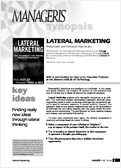Cultivate your creative potential

"Agile" companies need inventive leaders and employees. This said, one needs not possess an innate gift for creativity to be an innovator. How can we evolve our mindset to develop our own creative capabilities?
Many leaders, before arriving at their current position, were rewarded at school for their analytical skills and at work for their aptitude to plan and execute. Yet, they are often heard to sigh: “If I were only more creative." Others—sometimes the very same people—wonder, “How can we ensure that we finally come up with truly innovative approaches?”
Certainly, some people are more naturally imaginative, creative and inventive than others. Yet, assert innovation and creativity experts, a person can still be a true innovator without a naturally vivid imagination.
Indeed, great inventors are not necessarily born creative or recognized for their original thinking. The author of Making Ideas Happen underlines that innovation is rooted more in the ability to follow a rigorous process than in the aptitude to generate new ideas. Some very creative people have developed almost compulsive methods to trigger innovation, akin to Gordon Bell, head of research at Microsoft, who records, classifies and archives almost every single piece of information he collects each day.
Above all, developing your creativity requires changing your mindset, as one industrial unit leader testifies, “I long thought that I was not creative at all, until I discovered after turning 40 that I was actually rather good at it! A seminar on creativity taught me to put logic and the search for efficiency aside. Using a few simple techniques, I found that I took great pleasure in exploring the thousand facets of a situation and imagining new ways of doing things.”
Indeed, you can develop your capacity for creativity significantly, by working on your attitude and approach.
SubscriberSign in
to download
the synopse (8 p.)
VisitorI want to buy
this synopsis (8 p.)
VisitorI want
to subscribe
See also

Thinking differently
We all have a natural preference for what is familiar to us. Yet, to adapt to circumstances, companies and their staff must constantly reinvent themselves, which requires that they get out of their usual thinking patterns. How can you nurture this healthy habit?





